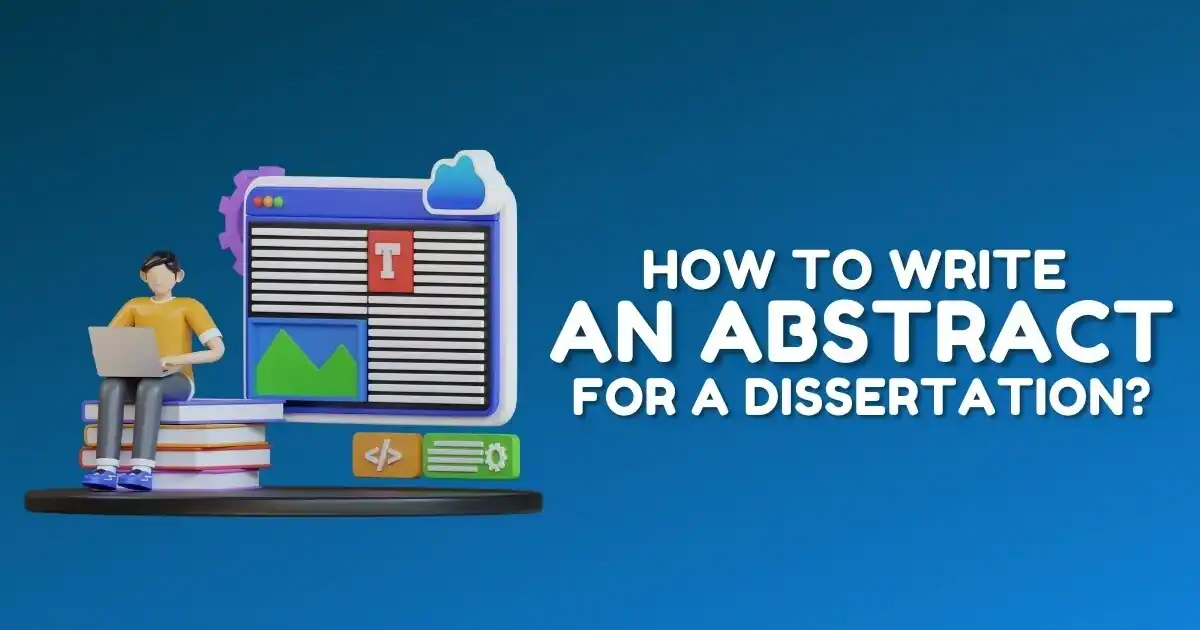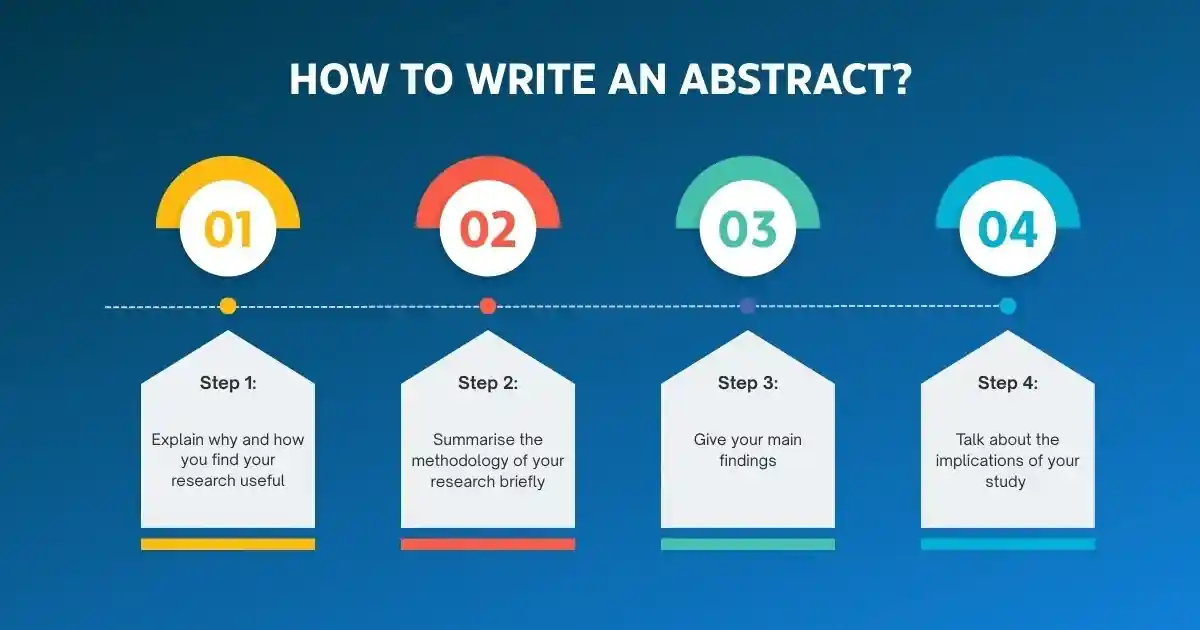What is Doctoral Dissertation?
A doctoral dissertation is one of the longest pieces of writing, in which you are the author, and you need to provide a ...

Whenever you sit down to write a dissertation, the first thing is that you will deal with is the abstract. Although it is suggested that you write the abstract in the end, as the abstract is basically a summary of what you have done in your dissertation.
In this blog, we will let you know how to write an abstract from start to end, starting with explaining what an abstract is and its purpose of the abstract. We have outlined every step; by following these steps, you can write an abstract that will capture your audience's interest in reading your dissertation. We have even shared the example of an abstract so that you can understand the complete process of writing an abstract for a dissertation.
We have collected information for this blog from various sources, including university guidelines, professionals who provide dissertation help UK, and authentic and trustworthy articles.
In simple terms, the abstract in a dissertation is a brief and well-structured overview of the most significant findings of a work (i.e., the key findings). The abstract should be approximately 300-500 words (or 1 paragraph) long, although this may vary depending on the university.
A small addition of terminology makes an abstract and a summary of your dissertation totally different when we are talking about academic publications. What generally happens with abstracts is that they only specify what the research work is going to entail, but not the findings, whereas in executive summaries, both the description of the research work, as well as the findings, are discussed. Where the abstract appears in a dissertation or thesis, however, it normally includes both in a summary of the whole.
A good dissertation abstract typically addresses the following, as far as content is concerned:
The first is to notify potential readers about the key point of your study without them reading the whole piece. In particular, it must convey what your research was about (what you were attempting to discover) and what you discovered. When deciding whether to read your dissertation, the abstract plays an important role in making the decision.
When asked by an expert who provides dissertation writing services in the UK, what is the other use abstract, they mentioned, another use of the abstract is related to search engines and the database of dissertations, in case your dissertation is indexed. You can use the keywords that may increase the chance of showing your dissertation above other authors in the abstract. Using the keywords and phrases in your abstract will help these search engines rank your dissertation higher.

As we have mentioned above, four main areas of your research have to be mentioned in your abstract: purpose, methodology, findings, and implications. Thus, the organisation of your dissertation abstract must mirror these 4 things in the following sequence. So, now we will examine each of them in detail, step by step:
In this space, you should briefly justify why you are undertaking your research and what value your research has. In other words, you must clarify what your study aimed to find out and why this is significant. In articulating the purpose of research, you must explicitly talk about the following:
It is vital to make this section very reassuring yet short and tight. This is where you make your reader interested in your project (marker) in and it is thus the opening portion. When you fail to put in the effort here, you will run the risk of losing their interest.
In this section, you must very briefly describe how you proceeded to answer the questions of your research. In other words, what kind of research design and research methodology did you use in your work? The following are some of the questions that are important to answer here:
The simple truth is that this section must cover how your research will take place. It does not have to be long (this is merely an overview, after all), but it should be able to clearly answer the four questions listed above.
Then, you should briefly derive key findings. There may be a temptation to ramble here since your research might have got you a lot of data and findings. But this part is simply the most important findings- in other words, the responses to the questions you proposed at the outset.
Once again, brevity and clearness are to be observed in this. You should concisely summarise the most significant findings for your reader.
Have you ever been faced with the task of going through a big report, trying to decipher what it all means to the bigger picture? That is where the implications section comes into play, to let us know the so what of your study.
In this step, you have to answer the following questions:
Here you can learn with the help of an example, this is an example of an abstract for a dissertation, in which we have clearly defined all of our steps, which are purpose, methods, findings, and implications.
(Purpose) The application process of citizenship is a legal, symbolic process that is influenced by numerous cultural processes in the United States. This research project will shed light on the experience and situation faced by applicants for citizenship who are residing in Dallas, Texas, to raise awareness of its ever-diverse population. Furthermore, this project will inform a particular client, who is an employee of Dallas Welcoming Communities and Immigrant Affairs, with knowledge of the lawful permanent residents in Dallas, who can become citizens, and their motives with respect to becoming a citizen.
(Methods) The research for this work was gathered by observational research at a number of citizenship courses and citizen-related activities, and even interviews were conducted with more than 14 U.S. applicants for citizenship.
(Findings) The reasons given in this project to be able to apply to become a citizen of the United States include the desire to be a member of the U.S. society, to have access to better economic and education facilities, better travel policies, and the wish to have the right to vote. Obstacles to the process of acquiring citizenship expressed in this project, are the time required for processing the application, not having the knowledge of the process, and the amount to be paid for the application. Additional themes include the impact of capital on the applicants' experiences with the citizenship process, how citizenship can be symbolically defined, transnationalism, and concepts of the just and unjust surrounding residency and the issue of the right to U.S citizenship.
(Implications) These results demonstrate that educational materials and mentoring are required in the context of the Dallas-area population applying to obtain U.S. citizenship, and programs provided by the local governments, which would create a sense of community among the citizenship applicants and other residents.
In formulating your dissertation abstract, one of the strongest devices you can employ is to attempt to put yourself in the position of an intended reader. Make it seem as though the reader knows nothing about the research area, but is interested in it. That is, make it understandable to the intelligent layman rather than the seasoned expert on the topic.
The place to begin is by trying to answer the question or seeking to know why I want to read this dissertation. Answering such questions will make you able to write an abstract all by yourself, and you won’t need to buy a dissertation online.
Remember to give ‘What, Why, How, and So What’ of your research in your abstract:
Be sure to use language specific to your area of study, but do not stuff your abstract with complicated words and jargon; this would complicate the presentation and be hard on the eyes. The abstract must be attractive to all tiers of prospective readers and not be a very difficult read. Keep in mind, you must write towards the intelligent layman.
In your abstract, present the most critical findings and observations, and do not withhold information since there is no point in hiding anything. The reader needs to see clearly in the abstract what the takeaways are for your dissertation. Naturally, when they find it wants a detailed description, they must enter the restaurant and test the menu.
Writing of an abstract will be nearly unavoidable when:
Students Also Like To Read: How Many References in a 10000 Word Dissertation?
Many of you may think that abstract is of no use, and think of avoiding it, before you go through this part to understand the importance of Abstract.
Read Also: How To Write a Dissertation: Format, Style, Process & Steps?
In conclusion, writing an abstract for a dissertation is not that difficult when you know all the steps of writing an abstract for a dissertation. The steps mentioned in this blog will help you understand how to write an abstract for a dissertation. As there are mainly 4 steps, which include purpose, methods, findings, and implications. It is always suggested that you write the abstract last, so that you know everything that you have done in your dissertation. You can mention findings, methods used, and how you implemented them in a better way. For your help, you can also go through the example of an abstract to understand things in a better way.
No, you must never avoid writing an abstract for your dissertation. An abstract is something that builds interest in your dissertation. An abstract makes your tutor understand what you have discussed in your dissertation.
Abstract can be written in 300 to 400 words, which is basically one or two pages. You must divide your word count according to that only, as an abstract is basically a summary of what you have done in a dissertation, so stick to direct points in it.
In case your university has not asked you to add an abstract, do not add then. As your university guidelines must be the top priority, but if they have neither restricted nor asked you to add an abstract, then you must add an abstract.
Yes, you can write an abstract in a thesis as well. Abstract works the same as it does for a dissertation.
Let's Book Your Work with Our Expert and Get High-Quality Content

Loved reading this Blog? Share your valuable thoughts in the comment section.
Add comment